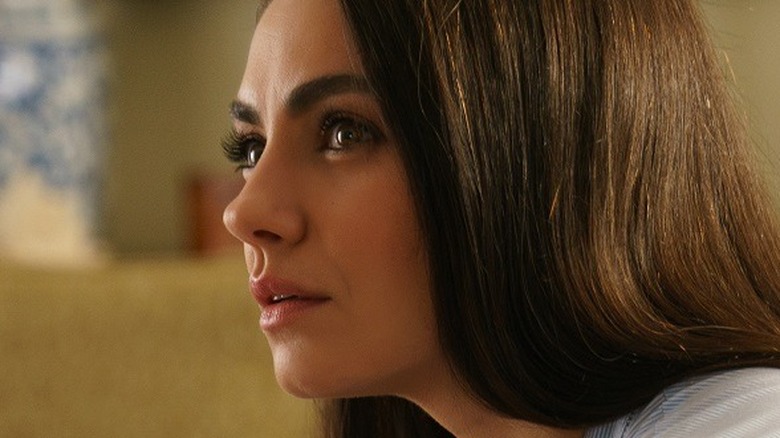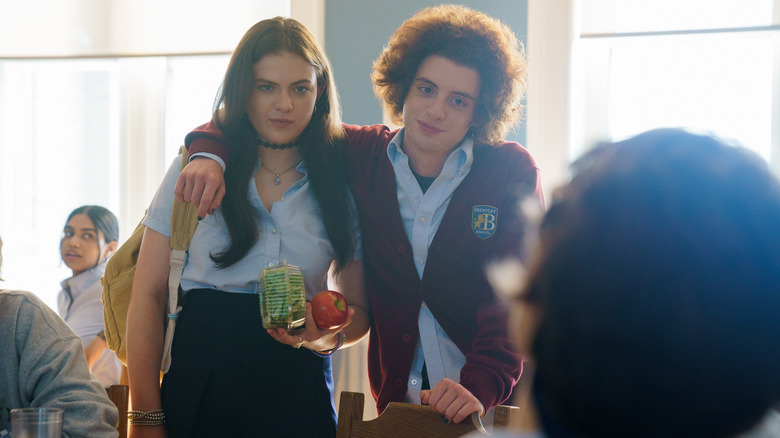Luckiest Girl Alive Review: Traumazine
- A fantastic turn from lead actress Mila Kunis
- Some truly powerful passages balancing a difficult tone
- Suffers from unfocused direction
- A stuffed screenplay that shifts in pace and mood
When "Luckiest Girl Alive" begins, it's hard to shake a sense of deja vu. Adapted for the screen by author Jessica Knoll from her own successful 2015 novel, the film feels of a piece with the same wave of post-"Gone Girl" novels it rode in on. The caustic wit, the subversion of white, middle class aesthetics, the general sense of dread as something violent and nefarious lurks beneath a comfortable, PSL & Pinterest vibe. But as much as that moment in popular fiction and mainstream thriller cinema has passed us by, this film still shows genuine promise.
It stars Mila Kunis as Ani Fanelli, a magazine writer in New York City whose secret past is returning to haunt her just as she's planning a wedding. It's a great role for an unsung actress who rarely gets dramatic turns the size and weight of her comedic work, and the story itself is a compelling, if overwrought, prospect. Unfortunately, director Mike Barker, a veteran of British TV dramas, is no David Fincher. He lacks the necessary guile and gravitas to shape this unwieldy material into something focused and sharp enough to pierce through the veil of essentially being for Lifetime original movies what A24 outings like "The Babadook" and "Hereditary" were for the horror genre.
It's a film held aloft by a terrific cast and some truly potent elements in the writing, but stifled by a paucity of bigger picture thinking. It's a shame to watch something so full of potential and so intermittently affecting be held back by an inconsistent visual language and the looming sense that it was made at the wrong time by the wrong people.
It girl, interrupted
"Luckiest Girl Alive" begins with a first act that feels almost like a joke. In establishing Ani's status quo, Knoll's script heavily relies on stilted voice-over narration, strip-mining her own source material for wholesale excerpts that must have read much better on the page than they sound coming out of Mila Kunis' mouth. We meet Ani as a shrewd, charming woman lamenting a disconnect between the carefully crafted identity she projects to the world around her, while alluding to a dicey past that manifests as abrupt cutaways to abstracted images of violence.
One moment she's bragging about how well she plays her part as the soon-to-be wife of Luke Harrison (Finn Wittrock), the perfect, old-monied beau, while cutting up a slice of pizza with a fork and knife. The next, he's off to the bathroom, and she's stuffing her face with animalistic ferocity, then staging a spill she can blame on the waitress to account for the missing food when he returns.
She writes scandalous felatio tip articles for a Cosmopolitan-esque publication called The Women's Bible, but her boss Lolo (Jennifer Beals) is promising to bring her along to The New York Times whenever the job offer is finalized. Luke wants her to move to London with him and get her MFA, but her desire to be on the masthead at a paper of regard is less about a childhood journalistic dream, but rather a deep seated need to cement herself as someone who matters, someone credible.
It all reeks of a weird kind of respectability politics that would be better off in the first 10 minutes of a Hallmark Christmas flick. But then Ani's tragic past begins to take shape, through flashbacks to the private school where she survived a mass shooting, and to the violent assault that preceded and complicated that later event. We can start to see why the zaftig Tiffani Fanelli (played in her younger years by Chiara Aurelia) wants so badly to become Ani Harrison, and get as far away from her overbearing mother (Connie Britton) and her toxic past as she can.
But a documentary filmmaker is trying to re-litigate the tragedy for the cameras, largely due to a fellow survivor, the wheelchair bound Dean Barton (Alex Barone) running for public office on a gun control campaign. Dean has maintained for years that Ani helped plan the school shooting that robbed him of his ability to walk, but before letting that accusation linger for too long in the viewer's mind, we see that this finger pointing was a premature way to deflect from Dean being one of Ani's attackers.
Kunis is dynamite in a role that asks quite a bit from her. We have to buy into the razor wit and calculated façade she's created in adulthood, as a self-professed people pleasing wind-up doll able to endear herself in every single situation she encounters. But she also has to be the believable product of Aurelia's awkward, pained youth, a lifetime of regret and self flagellation made manifest into this tenacious tulpa who can stand up as a grown-up and protect the little girl inside her in a way no one else would or could.
On the road to solidifying this unassailable alter ego, Ani loses more and more of her true self. She can't make a decision between The New York Times and London because she can't choose between herself and the trophy husband who only seems to love her when she's making it easy for him to. She also can't reconcile her own tangible innocence in the shooting with the fact that many of its victims were people she wished death upon for the horrors they subjected her and her friends to.
But, in between all of Ani's inner turmoil and the way that internal war affects her relationships, unpacking the twin tragedies of her life requires more nuance and care than a movie this stuffed can quite muster.
If you or anyone you know has been a victim of sexual assault, help is available. Visit the Rape, Abuse & Incest National Network website or contact RAINN's National Helpline at 1-800-656-HOPE (4673).
Girl in the mirror
"Luckiest Girl Alive" sings when it hews closely to Ani's journey to wrestle with her trauma, but it repeatedly falters whenever it has to linger on the bigger picture surrounding her.
The film's many flashbacks to her school years come in and out at such a strange pace, and they present an uneasy reality this movie just can't seem to make heads or tails of. Setting aside how Ani's past is defined by two extremely heavy transgressions set off like bombs within the film's plot summary, the circumstances of both these events, and how tethered they are, is just too much to get into when over half the runtime needs to deal solely with Ani's present day and how the past has impacted her.
This is, essentially, a movie that spends more time showing how scummy, entitled and awful the victims of a school shooting were then exploring why the petty class warfare of the rich kids versus the outcast freaks made the latter feel like blasting the former away with firearms was the only solution to an endless parade of abuse. It's a far cry from the American mythology of incels and bullied youth taking to violence over more nebulously defined slights by society at large. It literally positions the school shooting as a strangely righteous bit of revenge, the third act of a Quentin Tarantino movie by another name.
When it sticks to Ani's place in this predicament, we get some great moments. All the clunkiness of her earlier voiceover work feels worth it when she accidentally says something withering and cruel about a future in-law aloud. Barker and Knoll's tendency to cut around her chronology at will work well when they shift immediately from Ani's mom being messy at her dress fitting to her poking fun at her daughter's weight in the past. It's also great when Ani's genuinely triggered in the present by past visions we're seeing for the first time, and that haunting imagery gives way to palpable tension between her and her fiancé as a direct result.
Unfortunately, though, those individual bits that hold such power wind up strewn about between all the other puzzle pieces that don't always fit together flush, especially with a TV veteran at the helm throwing frequently incongruous visual approaches a the wall and hoping they stick.
But there are times in "Luckiest Girl Alive" where Mike Barker finds the right angles to capture what matters most. Mila Kunis obviously does the heavy lifting, but throughout the film, he constantly places her at canted angles around reflective surfaces she's never quite facing head on. Her identity is perpetually in flux, shirking loyalty to the self whenever it's necessary to move closer to the goals she set as a teenager. It's not until the film's final act that she reconciles her past with her present, resulting in a shot where she's backstage at a daytime TV show, perched in the make-up chair and surrounded by beauty mirrors shining back a merged, true self. One she can actually smile at.
This perfect moment dovetails into the film's closing moments, that feel like they're going to be a satisfying little callback to a chance encounter in Ani's youth that proved to be the "bat through the window" moment in her origin story. Instead, it goes for a snarky little bit that ends the film on the same lackluster note that discordantly interrupted so many of its best scenes.
"Luckiest Girl Alive" is now available to stream on Netflix.


